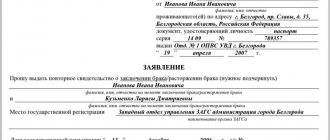The birth of a baby in a civil marriage often causes certain difficulties for parents with paperwork. Not everyone knows how to register the father of a child if the marriage is not registered. We will find out whether the mother needs to collect papers confirming the fact of paternity, what patronymic and surname it is permissible to give to the baby, and whether the man’s consent is required to indicate his data on the birth certificate.
Bastardy
Children were always born. And often outside of official relations. Society did not welcome this. Therefore, they tried not to make it public. The opening of the Iron Curtain led to the fact that a child born before the legalization of life together was no longer condemned by society. But the lack of official confirmation that he has a father gives rise to certain difficulties. Single mothers receive government support, monthly payments and benefits.
In the modern world, the concept of civil marriage is widespread. This status is assigned to families who live without official registration, but have joint property and a household. Previously, such relationships between a man and a woman were called cohabitation. Civil marriage has many supporters who are fighting to give it legal status. But so far, legal norms for such relationships do not exist, and accordingly, such partners cannot defend their rights, and if they do not sign, the resulting child will also be deprived of the privileges that a child whose parents have signed has.
Documents for registering a surname
So, in order to register a newborn, you must appear at the registry office at your place of residence. If the parents are married, then either of them can do this. You need to have a package of documents with you:
- Passport;
- Marriage certificate;
- Birth certificate issued by a medical institution.
When registering a child by a man and an unmarried woman, the following will be required:
- Passports of both;
- Joint declaration of paternity;
- Birth certificate.
If, for certain reasons (death of the mother, incapacity, deprivation of parental rights, lack of information about her whereabouts), the father must independently register the baby, he alone submits an application to establish paternity. Additionally, you must obtain permission from the guardianship authority.
Legal aspect
According to Article 58 of the Family Code, a child has the right to receive a first name, patronymic and last name. He can receive them within three months after birth. If there are compelling reasons, these data can be changed. When a child is born outside of an official relationship, it can be recorded:
- in the mother’s surname, with the assignment of the biological father’s patronymic or other data;
- on dad's last name;
- on the surname of any person, even if he is not related to the baby.
The easiest thing for a mother to do after giving birth to a child is to assign him a middle name. Since it does not require any legal documents or grounds. But the mother can only give her child her own surname. To do this, she will only need a certificate from the maternity hospital and her passport.
Is it necessary to adopt a child born outside of an officially registered marriage?
The interests of a child are maximally protected if he has two legal parents, and it does not matter whether he is born in wedlock or not. Children with established paternity and those born in marriage have equal rights.
Paternity gives the mother/guardian the right to obtain alimony or a survivor's pension. Children with established paternity have the right to participate in inheritance.
A citizen who has established paternity has the right to seek the opportunity to communicate with the child and participate in upbringing, choose an educational institution, country of residence, etc. The blood father cannot adopt children - the relationship must be legitimized through the procedure of establishing paternity.
Record about father
A common-law spouse is just a concept accepted in society. Legally, such a term does not exist. Therefore, at the birth of a child, it is not included in the certificate. For men, this position is very convenient, since he is automatically freed from any responsibility. At a completely legal level, such a father, even if biological, may not raise or support the child. But do not forget that paternity can be established by compulsory judicial procedure.
Paternity can be established not only at birth, but also during subsequent years of adulthood. This will oblige the biological father to financially support the child and pay child support.
Voluntary consent
If both parents agree that the man will be registered as the father of the child, they need to:
- before the birth of the baby, contact the registry office with a statement that this man is the biological father of the unborn child;
- after the baby is born, the man must write to the registry office a statement that he recognizes his paternity (if he does not have a passport, another ID card will do).
Note! There are no specific deadlines for acknowledging paternity.
According to the mother
A woman living in civil law can only independently assign a middle name. But she has no right to draw up papers that require the biological father’s data. Only the father himself can enter them. According to the mother, the data can be formatted as follows :
- the woman must obtain a certificate from the registry office at the maternity hospital;
- fills out an application where he writes the child’s last name, first name and patronymic.
But there are also exceptional circumstances that allow a woman to include her father. There are legally established cases:
- divorce occurred less than 300 days before the birth of the child;
- death of a spouse and lack of evidence that he was not the biological father;
- the birth of a child within 300 days after the official divorce.
In these cases, the data is compiled on the basis of pre-existing data.
Methods for registering a newborn born out of wedlock
If a child was born out of wedlock, the mother is indicated in the metric based on her application and a medical document about his birth. Registration of a citizen by father is possible after:
- joint application by both parents;
- father's statements to the registry office;
- establishing paternity in court.
The Family Code provides rules for the procedure for each case. To simplify formalities, parents can register their marriage before the birth of the child.
Submitting an application together with your common-law spouse
If a child is born in a civil marriage, both parents, in order to register the newborn, present the following documents to the registry office during the first month of life:
- birth statement (drawn up by the mother or her authorized representative);
- application to establish paternity (drawn up jointly).
In a joint application, common-law spouses can indicate what surname they wish to assign to the newborn. The main thing is that the man recognizes the child as his own. If problems arise with choosing a child’s name (for example, the desired name is not in the dictionary of personal names of civil registry office employees), to assign an unusual name, you must obtain permission from the guardianship and trusteeship authority at the place of residence.
Unlike the birth registration itself, the establishment of paternity is not limited by specific deadlines. This procedure can be carried out later than a month through the civil registry office or in court.
If there are ready-made applications, the mother and father with passports and a receipt for payment of the state fee for registering the establishment of paternity apply to the registry office. If changes are made to a previously issued birth certificate and a new document is issued, a state fee must be paid for these actions.
A declaration of paternity can be filed while a woman is pregnant. The law allows this if there is sufficient concern that after the birth of the child it will be impossible or difficult (for example, in the event of arrest).
Currently, registration is practiced through the State Services website. The applicant or his authorized representative enters the details of the documents according to the list into the database. The system processes all application data and sends requests to government agencies to verify information and register. At the appointed time, you must visit the registry office to put the necessary signatures and pick up the completed documents.
An officially registered citizen of Russia has the right to claim inheritance, including that of his father and other relatives. Thanks to the recognition of the child by the father, his parents become grandparents with the corresponding rights: to see him, take part in his upbringing, development, maintenance, etc.
Appeal initiated by the child's father
A man can solely declare paternity if a woman has died, lost her maternal rights, or her whereabouts have not been established. In this case, he fills out a form at the registry office called “Application from a father who is not married to the child’s mother at the time of birth.” It indicates information about the availability of one of the documents:
- mother's death certificate;
- court decisions declaring a woman incompetent/missing after the birth of a child;
- court decision to deprive the mother of parental rights.
The father is required to obtain written consent from the guardianship and trusteeship authorities. It must be attached to the application. Sometimes a man wants to establish paternity, but the woman resists this. This situation is resolved in court.
Marriage before the birth of a child
There are restrictions on marriage, one of which is age. Both spouses must be 18 years old. If the bride is expecting a child (the fact must be confirmed by medical documents), marriage registration is allowed from 14-16 years of age, depending on the region of residence of the future spouses. In this case, permission from the guardianship authorities or local administration is required. Reducing the age is allowed in the interests of the future child, for whom both parents will be included in the birth certificate when registering the act of birth.
For the same purpose, representatives of the civil registry office are reducing the time period between filing an application and registering a marriage. Depending on the stage of pregnancy and the woman’s well-being, it can be reduced to 1 day with a medical certificate. If a woman is hospitalized or is forced to remain in bed at home, the registrar is obliged to go to the location of the expectant mother and sign up for the newlyweds.
Appeal to the court and establishment of paternity
To establish the paternity of a specific person, an application is sent to the court from one of the parents, guardians or persons who are dependent on the child. Witness testimony about the fact of cohabitation or communication between the couple in the 10 months preceding the birth is considered as evidence. The court may decide to conduct a genetic examination, but does not have the right to force it. The procedure for conducting DNA analysis is prescribed in Law No. 73-FZ and acts of the Ministry of Health of the Russian Federation.
Children themselves who have reached the age of majority can act as an applicant to establish paternity. The specifics of the trial are enshrined in Art. 48 and 49 of the Family Code.
According to a joint statement
Unofficial relationships entail legal difficulties within the family. If a man wants to register the child as his own, then this procedure is quite simple. Since the child has the right to both parents. Therefore, paternity establishment is done as quickly as possible and without paperwork. There will also be no need for difficulties in the form of passing DNA tests.
In order to establish paternity, both parents come to the registry office. The man fills out the appropriate papers, the woman signs her consent. Immediately after registration, the fact of establishing paternity is entered into the official papers on the birth of the child. If a man does not want to acknowledge the fact of paternity, the woman can appeal to the judicial authorities.
Choosing a first name, last name and patronymic
Parents who are in a registered marriage must choose a full name. child together. The following rules apply here:
- The name is chosen by mutual consent; if it contradicts national tradition, is dissonant or offensive, registry office specialists may refuse to issue a certificate.
- The patronymic is entered using the father's name.
- The surname is given either by the father or the mother. It is acceptable to give a child a double surname, for example, Smirnov-Sobolev. In this case, the order of joining the surnames of the father and mother can be any, but it must be the same for all half-brothers and sisters of the newborn (i.e., all children in the family must be Smirnov-Sobolev).
If the parents were unable to agree on what full name. give to the child, the dispute will be resolved with the participation of the guardianship authorities (Article 58 of the RF IC). The same authority must be contacted if it is decided to give the child an unusual name that is not in the special dictionary of personal names.
In cases where the marriage is not registered, the mother independently decides what to name the baby. The newborn receives his last name, first name and patronymic at her discretion. The biological father has no say in this situation.
Possible problems if mother and child have different surnames
If the child and mother have different last names, difficulties may arise after divorce or the death of the father. First of all, the problems will be related to the obviousness of the family connection.
To avoid this, you need to enter information about the newborn in the mother’s passport in the “children” column. This can be done at the passport office by presenting the child’s birth certificate. Difficulties may arise when contacting various authorities. Therefore, you should have with you a complete package of documents that confirms the change of surname by the mother and the fact of the relationship with the child. The following documents are required as confirmation:
- Child's birth document.
- Divorce document with a note about the mother's change of surname.
- Marriage document if the mother got married again and changed her data.
- A marriage certificate received from the registry office, which confirms the existence of a marriage relationship in the past.
In the case of different surnames of the mother and child, there may be problems when traveling abroad with a minor. In such a situation, you should also carry documents with you that confirm the existence of a relationship.
To avoid additional difficulties, you need to have an official translation of the child’s birth certificate. This can be done at the consulate of the country you plan to visit. Thus, if parents have different surnames, then the child can receive the surname of either mom or dad.
If at the time of the birth of the child the mother and father are not in an officially registered marriage, then the newborn can be given the father’s surname. To do this, the father must write a statement of paternity, on the basis of which information about him will be included in the child’s birth document. If a parent does not recognize his paternity, this can be done in court, in which case the child can also receive the father's surname.
Establishing paternity in court
Both parents can sue. But most often it is the mother who resorts to the services of lawyers. To oblige a negligent father to take responsibility for upbringing and financial support. There are exceptions when a woman has compelling reasons to refuse to establish paternity. And the man himself insists on this. Such disputes can only be resolved by the court.
Lawyers take a responsible approach to resolving such disputes. They study all the collected evidence and listen to the arguments of both sides. Witnesses are heard to determine the existence of the fact of living together and maintaining a common household. If necessary, DNA tests are performed. But only on a voluntary basis. Coercion is prohibited, but if a man evades this without special reasons, such a fact can serve as a basis for recognizing him as the biological father in court.
How to register a newborn
According to current legislation, within one month after the birth of a baby, parents must contact the registry office to draw up the relevant documents. If the marriage between father and mother is registered, the presence of one parent is sufficient. Otherwise, they will have to apply for a birth certificate together.
The presence of the mother and father at the registry office is confirmation that they both recognize themselves as parents, realizing the consequences of their actions in registering the newborn. It is very difficult in practice to challenge the fact of paternity if a man has personally drawn up an application recognizing him as the child’s parent. allows this possibility only if it is proven that the citizen was forced to do so (he was subjected to psychological pressure or physical influence).
The fact of paternity can only be challenged in court: the man will have to independently justify and document the reason why he abandons the child.
Is it possible not to indicate information about the father at all?
At the insistence of the mother, it is permissible not to include information about his father in the child’s certificate (,). However, women very rarely decide to take such a step, since the lack of this information prevents them from receiving legally due alimony and other assistance from the second parent. In addition, a dash in the document may negatively affect the attitude of others towards the minor.
If there is no information about the father on the birth certificate, but after a while life circumstances change and the mother decides to add it anyway, then after all the necessary procedures have been completed, the child can be issued a new certificate, which will indicate information about both parents.
How to register a newborn child: necessary documents and nuances
Every person who lives in a rule-of-law state has rights that must be strictly observed by everyone. One of the rights is registration at the place of temporary residence or permanent residence. It is necessary to register a newborn child, thereby declaring the location of the new citizen on the territory of the state. This procedure is quite simple, requiring a minimum number of documents and very little time.
Assigning a surname to a minor: procedure
The process of naming a newborn is regulated by the Family Code of the Russian Federation. By “name” one should also understand the surname and patronymic, and not just the given name. Article No. 58 of the RF IC defines the following points:
- The child's surname is recorded in accordance with the one used by the parents and by their mutual consent. If the couple has not come to a common decision, that is, a dispute has arisen, the guardianship authorities will consider the issue. When the mother and father have different surnames and are in an unregistered marriage, the issue is resolved through establishing paternity or at the will of the mother.
- The determination of the patronymic follows the same pattern. When the biological father does not declare his rights to the child, then there will be a dash in the corresponding column in the documents (only if the children were not adopted and the couple did not officially register the marriage). In this case, the mother has the right to indicate the middle name at her own discretion.
- Choosing a name for the heir is a joint responsibility of the parents. When a citizen is listed as a single mother, her name will also be recorded at her personal discretion.
The selected initials of the newborn are entered into two documents: a birth certificate and a registration record in the registry office. The certificate can be received in hand no earlier than the established deadline. Registration officials may ask the couple to sign them to simplify the process of registering the child.
If the parents sign after the birth of the baby
Sometimes the mother and father get married after the birth of the child. This is not a basis for changing the legal status of the spouse in relation to the child. Therefore, you will have to recognize a minor in one of the available ways.
If paternity is not recognized, the following problems may arise in the future:
- when receiving an inheritance, it will be necessary to prove to the child that the testator was indeed the biological father,
- when establishing benefits for obtaining a place in educational institutions, it will be necessary to provide an expanded package of documents if, due to the work of the father, the minor can be enrolled without waiting lists,
- when applying to various government agencies where the presence of both parents is required.
Thus, it is recommended to recognize the child as early as possible if the marriage took place after the birth of the baby. Today, DNA testing is carried out even after the death of one of the parents.
To do this, it is necessary to conduct an analysis that will establish the relationship between the parties. It is required to provide biological material of the alleged father or his parents (relatives)
Children in a civil marriage
Financial support for a child is one of parental responsibilities. The procedure for the emergence of parental rights and responsibilities is established by Art. 48 RF IC.
Confirmation of the relationship between a parent and a child is the entry of the father and mother’s data into the children’s documents. Information about the mother is included when registering the birth. Relationship is confirmed by a medical birth certificate and the woman’s civil passport.
Inclusion of information about the father can be done on the basis of one of the following documents:
- marriage certificates;
- divorce certificates;
- personal statement;
- court decision.
Thus, in order to collect alimony for a minor child in a civil marriage, it is necessary to enter the father’s data into the children’s documents.
Changing a child's last name after divorce
When divorcing, married couples have to deal with many different issues. It is most difficult for those families in which children are growing up. Former spouses must agree on their place of residence, maintenance, and upbringing.
In some cases, questions are also raised about changing the surname of children. The reasons for this may be entering into a new marriage, or changing the personal data of the parents.
The law allows changing your full name, but subject to certain conditions. An important role in this is played by the age of the children, the status of their relatives, and the availability of the necessary permits. If the child is not yet fourteen years old, this is only possible:
- by mutual consent of his parents;
- with permission from the guardianship and trusteeship authorities.
It is important to keep in mind that upon reaching the age of ten, children also have the right to express their views on this issue.
With the consent of both parents and guardianship authorities, taking into account the child’s opinion, it is possible to give the child the mother’s surname after a divorce. When supporting documents are provided by the Civil Registry Office employees, changes are made to the previously made entry and a new certificate is issued. However, after separation, not all married couples manage to maintain normal relationships. Therefore, it is not always possible to obtain a man’s consent to change the children’s full name. Difficulty in obtaining permission may be caused by former spouses living in different cities or loss of contacts.
As a general rule, it is impossible to do without the man’s consent. But in some cases it is not necessary to take into account his opinion:
- If he died or is declared dead. When the fact of death is established through a court, the same consequences occur as in the case of a natural death.
- When a man is deprived of parental rights by court decision.
- If the court declares him incompetent in full.
- If it is not possible to establish his place of stay or residence.
- If he does not participate in the lives of his children, does not visit them, and evades paying child support payments.
If at least one of the listed reasons is present, a woman can independently decide on changing her surname. This does not exempt her from the need to apply for permission from the guardianship authorities and take into account the opinion of children after ten years. To obtain consent, you must provide documents confirming the existence of these circumstances.
If we are talking about deprivation of paternal rights or incapacity, then it is required to present a judicial act that has entered into force. In any case, the final decision is made by the guardianship authority. It is important to know that if the marriage was not registered, but there is an entry about the father in the certificate, then his opinion will also have to be taken into account.
Birth Statement
The statement as an official document is used to convey relevant legally significant information to specific entities. In the case under consideration, such a subject is the state represented by the civil registry office. It is precisely because of its functions that the statement begins with the words “ we declare the birth of a child... ”.
The following is an informative part: 2- it contains information about the parents. The following information is reported :
- surname, name, patronymic of father, mother;
- date, place of their birth;
- citizenship of parents;
- nationality (and in this case this detail is not mandatory, this information is indicated only at your request of the father and mother);
- location;
- identity document (this is its name, number, series, name of the authority that issued the official document, time of issue);
- grounds for entering information - a document on the birth of a child (you need a record of the act No., day, month, year of the registration, the name of the civil registry office that made the record).
This is the specificity of registering a child born in a civil marriage. Fulfillment of all requirements and provision of a complete package of documents will ensure the prompt implementation of the procedure.









